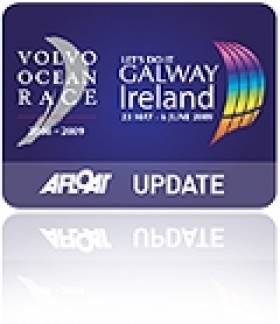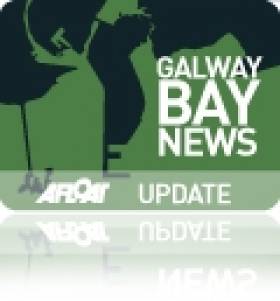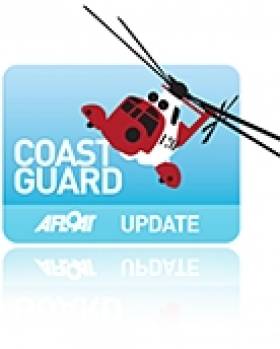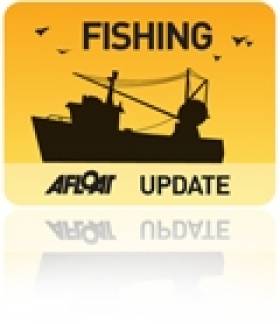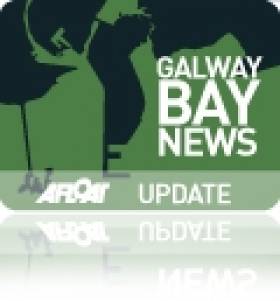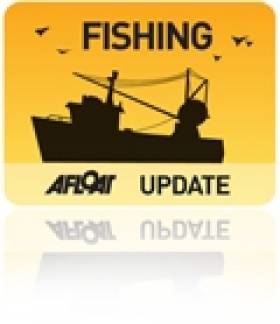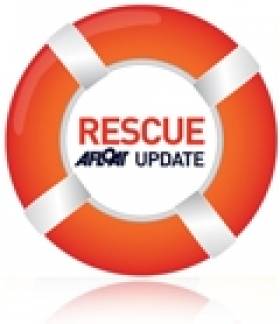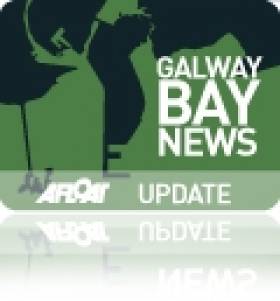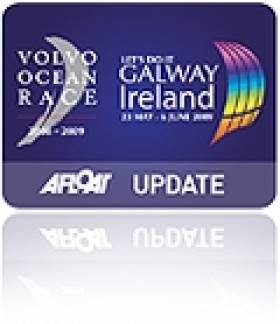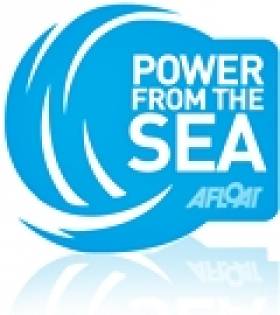Displaying items by tag: Galway Bay
#VOLVO OCEAN RACE - It has been revealed that a new coastal radar system developed at NUI Galway was instrumental to the success of the PUMA team in the in-port races at the recent Volvo Ocean Race finale.
The radar system, which measures currents and waves throughout Galway Bay on the hour, is run by Dr Mike Hartnett’s research group in the newly launched Ryan Institute at NUI Galway.
The sophisticated system is normally used for advanced marine research, but PUMA Ocean Racing performance coach Robert Hopkins Jr contacted the researchers to see if their radar data could be used by his crew to get the edge on the CAMPER team, with which they were tied on points.
Maps of the currents in the bay over the past month were made available to PUMA and Dr Hartnett advised team on their sailing strategy for the important race.
PUMA went on to win in great style and win the series by a one-point margin. The win also marked PUMA’s first trip to the top of the podium for an in-port race in this round of the Volvo Ocean Race.
PUMA finished on the podium in nine of the 10 in-port races, collecting 45 total points to win the overall In-Port Race Series.
Hopkins was delighted with the result. “Currents in Galway Bay were a big factor in the in-port race, where tides, wind and river outflow make it all very complicated," he said. "To prepare for the race, we looked for surface current patterns in hundreds hours of data from the NUI Galway radar, took on-the-water readings before the start, and data from Mar Mostro’s own Doppler velocity log supplied by Nortek AS. It worked and we won the race.”
The NUI Galway radar data will soon be available online to the public, hopefully helping local sailors to improve their performance.
Dr Hartnett acknowledged the assistance provided by two local businessmen in enabling this advanced technology.
“The Spiddal radar site is sending its data back to the computers at NUI Galway via the broadband service of An Crúiscín Lán, thanks to the permission of owner John Foy.
"Similarly, Liam Twomey, general manager of the National Aquarium of Ireland, Salthill, provided access to their broadband to courier the Mutton Island radar data back to NUI Galway.”
#GALWAY BAY NEWS - Elite triathlete Bryan Keane and international runner Lizzie Lee were the big winners at the National Aquathlon Championships in Galway Bay last weekend.
Competitors fought it out over a course that included a 2km swim and a 10km run, differing from the traditional triathlon in the omission of a cycling stage.
As TheJournal.ie reports, Keane was first out of the water with an impressive time of 26 minutes 4 seconds - and he maintained his domination over the field in the running portion, covering the distace in just 33 minutes 13 seconds.
Meanwhile, in the women's race, Lizzie Lee was third out of the water but her extensive running experience helped her pull ahead of the pack on foot, crossing the finish line with a lead of nearly 2 1/2 minutes.
A selection of images of the race from photographer Martin Jancek are available HERE.
Woman Airlifted from Cruise Liner in Galway Bay
#COASTGUARD - Galway Bay FM reports that an elderly woman was airlifted by the coastguard from a cruise liner in Galway Bay yesterday morning.
It's believed that the passenger was experiencing cardiac problems.
The woman is a passenger on the Marco Polo, the 800-passenger cruise vessel that was recently anchored in Bantry Bay, as previously reported on Afloat.ie.
Her condition was assessed on board by paramedics before she was taken to Galway University Hospital by the Shannon-based Irish Coast Guard rescue helicopter.
#FISHING - Bord Iascaigh Mhara (BIM) has announced a "substantial delay" before it publishes the licence application for the controversial proposed deep-sea fish farm in the Aran Islands, as Galway Bay FM reports.
Though publication was originally planned for the beginning of this month, BIM says it will be another four to six weeks before it will be made available, following "meaningful and informative feedback" from the public during the most recent round of consultations on the project.
As previously reported on Afloat.ie, the 15,000-tonne organic salmon farm would be located off Inis Oírr on a 500-hectare site in Galway Bay, and would be one of the largest of its kind in Europe, projected to be worth €103 million annually for the economy.
Approval of the project could see the creation of as many as 400 jobs.
But the scheme has faced opposition from local anglers who fear that the fish farm could have a detrimental effect on wild salmon numbers.
Noel Carr, secretary of the Federation of Irish Salmon and Sea Trout Anglers (FISTA), described the fish farm plans as his group's 'Alamo'.
#GALWAY BAY NEWS - Ballyvaughan Bay Hop will run a fast ferry service between Ballyvaughan in Co Clare and Galway City to coincide with the opening ceremony of the Volvo Ocean Race finale on Saturday 30 June.
As reported last year on Afloat.ie, proposals for the Galway Bay ferry link aimed to half the travel time between the Burren region and Galway City.
Departing from the New Pier in Ballyvaughan, the service will run three times daily facilitating park-and-ride commuters from the North Clare area.
According to the ferry operators, a 10-journey commuter ticket is cheaper than a tank of petrol, making the ferry a more cost-effective and eco-friendly commuting option.
The service will also "provide travellers from Galway with a novel way to visit and explore the Burren, with accommodation and meal value packages with Ballyvaughan eateries and guesthouses available to enhance their trip."
The service will be operated by Rib West on behalf of Ballyvaughan Bay Hop in a fully licenced enclosed passenger RIB as part of a pilot project to establish a community fast passenger service serving the North Clare region.
For more information visit the Ballyvaughan Bay Hop website HERE. There's also a chance to win tickets for the ferry on the Bay Hop Facebook page HERE.
#FISHING - Bord Iascaigh Mhára (BIM) has moved to allay fears that the proposed new fish farm in the Aran Islands would have a detrimental effect on wild salmon numbers, according to the Galway Independent.
BIM was reacting to concerns raised at a meeting of the Federation of Irish Salmon and Sea Trout Anglers (FISTA) held last Sunday, ahead of which the federation's secretary Noel Carr described the fish farm plans as its 'Alamo'.
As previously reported on Afloat.ie, BIM launched the consultation process last December for its proposed deep-sea salmon farm in Galway Bay on a 500-hectare site north of Inis Óirr.
Approval of the project, which would be one of the largest of its kind in Europe, could see the creation of 350 direct and 150 indirect jobs.
Among his group's concerns, Noel Carr told the Galway Independent that salmon farms such as that proposed for Galway bay were finding wild fish out in the North Atlantic and “hoovering it up to make fish meal”.
But Donal Maguire, aquaculture development manager for BIM, said that argument was "not true", adding that "the world catch for fishmeal has been sustainable for about the last 35 years".
The Galway Independent has more on the story HERE.
#RESCUE - The Galway Independent reports that two men were rescued by the Galway RNLI lifeboat on Sunday when their boat got into difficulties in Galway Bay.
The yacht was crossing from Barna to Spiddal when it suffered and engine failure and began to drift in the stormy weather conditions that have battered the west coast in recent days.
Lifeboat volunteers were notified by the Irish Coast Guard and located the 22-ft yacht two miles from Barna. Both crew and boat were returned to their home port, and no injuries were reported.
#GALWAY HARBOUR - Galway Harbour management are looking forward to the prospect of Chinese investment in the port's redevelopment plans, the Galway Independent reports.
“Chinese investors clearly recognise not only the massive potential of ocean tourism, but also the specific potential for Galway as a destination port for cruise liners," said Fine Gael TD Brian Walsh, referring to discussions between the Government and Chinese officials in Beijing last week.
As previously reported on Afloat.ie, Galway Bay can expect to welcome at least nine cruise visits thus year, with the first scheduled to arrive late next month.
Walsh added: "Galway is an incredibly attractive city, and if we can make it accessible to the major players in the cruise-line market, the impact on the local economy would be immense.”
Galway Harbour Company CEO Eamon Bradshaw said that the port project had "illicited quite a bit of interest" when the company presented at the recent Chinese-Ireland Relations conference at NUI Galway.
"We’re confident that we do have a lot to offer and we are confident that an investor will come on board."
The Galway Independent has more on the story HERE.
No Red Arrows for VOR Galway
#VOLVO OCEAN RACE - Red Arrow jets will not be returning to the skies over Galway Bay when it hosts the Volvo Ocean Race finale this summer, the Galway Sentinel reports.
The Royal Air Force (RAF) has turned down a request by event organisers to bring its aerobatic display to the City of the Tribes citing 'operational reasons'.
It is understood that the RAF is reducing the number of Red Arrows performances this year due to a shortage of pilots trained to do air displays.
The Red Arrows flyover was one of the highlights of Galway's 2009 hosting of the yacht race.
However, their proposed return was opposed by anti-war campaigners the Galway Alliance Against War, who issued a statement last week declaring the the RAF and another "war outfit" were lined up as entertainment for the race week.
The Galway Sentinel has more on the story HERE.
Cork Company Set to Deploy Energy Device at Cornwall's Wave Hub
#POWER FROM THE SEA - An Irish firm has landed a contract to provide a wave device for a new offshore energy test site in Cornwall, Siliconrepublic reports.
Ocean Energy, which is based in Cork, will deploy its first full-scale wave energy device at Wave Hub - described as an 'electrical socket' for testing wave power technology - off Hayle in north Cornwall by the end of the year.
The technology behind the buoy-type device, which will cost €9 million, has been developed over the past three years via a quarter-scale prototype in Galway Bay.
Using the principle of the oscillating water column, the device works by channeling water through a submerged chamber that forces air through a turbine above the surface.
The full-scale unit is expected to generate enough electricity to power as many as 1,200 homes.
Siliconrepublic has more on the story HERE.



























